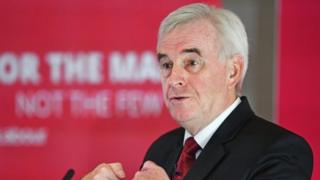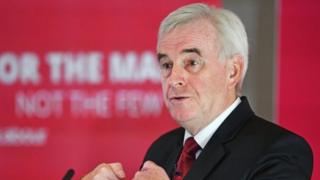General election 2019: Labour vows Budget ‘to end austerity’ in first 100 days
John McDonnell will also set out plans for “democratic control” of nationalised water and energy. …

 Image copyright PA Media
Image copyright PA Media John McDonnell will promise to deliver a Budget to “end austerity”, in a speech setting out Labour’s priorities for its first 100 days in government.
The shadow chancellor will also vow to get “money moving out of Whitehall and the City” if Labour win the election.
And he will detail plans for “democratic control” of newly nationalised water and energy firms.
The Conservatives are also pledging to increase public spending, but not on the same scale.
They have criticised Labour’s spending plans as “reckless”, claiming they would lead to an economic crisis within months of the party taking office.
Conservative leader Boris Johnson is set to visit four Labour-held seats which voted for Brexit in the North-East of England on Monday, with three days to go until polling day.
Labour leader Jeremy Corbyn will, meanwhile, tour Labour target seats in the south of England, as his shadow chancellor sets out his economic plans.
Labour is proposing a big increase in spending on public services and social security to be funded by higher taxes on companies and better-off workers and government borrowing.
‘Market forces’
They are also planning to take train companies, Royal Mail, the water industry, the big six energy firms and BT Openreach into public ownership.
In a speech, Mr McDonnell will set out details of what will be in his first Budget, if Labour wins Thursday’s general election – including the new bodies to oversee nationalised utilities.
They were first announced last month in the party’s manifesto.
He will say: “In our first hundred days we will start the process of bringing water and energy into public ownership.
“We’ll set up boards to run them made up of you, the customer, and you, the worker, as well as representatives from local councils, metro mayors and others.
“We’ll make sure decisions are taken locally by those who understand the services – those who use them and deliver them. Meetings will be public and streamed online with new transparency regulations set higher than ever before.
“So you can see if your road is being dug up, why, and for how long.
“And we’ll create new People’s Assemblies to hold these boards to account and give everyone the option of participating in how their utilities are run.”
He will accuse past governments of “leaving the fate of whole communities at the mercy of market forces.”
Low paid jobs
He will also outline Labour’s plans to invest in green industries, skills training and regional development.
“Good jobs and whole industries that were once the pride of our country have been lost and replaced with dreary, exploitative, insecure and low paid jobs – or in some cases no jobs at all.
“No wonder people feel disillusioned in politicians.
“As our manifesto makes clear, turning these two things around will be our number one priority in government.”
If Labour wins the election, the shadow chancellor says he will set up a National Transformation Fund Unit before Christmas and create a new National Investment Bank, regional development banks and a Post Bank.
The National Transformation Fund will be managed from a new new department of the Treasury, based in the North of England.
Brexit deal
Labour’s National Investment Bank – previously featured in the party’s 2017 manifesto – would have £250bn to lend with a focus on small businesses whose work ties in to the government’s industrial strategy.
The party is also pledging to kick off negotiations with the EU on a new Brexit agreement, which would keep the UK in a customs union and closely aligned the single market, shortly after taking office.
It plans to put the new deal to a referendum, within six months of taking office.
The Tories, Lib Dems and Labour all say they would take advantage of low interest rates to borrow money to invest in infrastructure.
Labour and the Lib Dems would also increase corporation tax, while the Conservatives have scrapped a planned cut to the rate of it.
Labour say they would increase taxes on the top 5% of earners, those taking home £80,000 a year or more, although Jeremy Corbyn has conceded that some people on low incomes could also pay more tax under Labour’s plans.
The Conservatives have pledged to freeze National Insurance, income tax and VAT rates and promised a tax cut in their first Budget by increasing the National Insurance threshold, so workers will not have to pay it until they earn £9,500.
It comes as SNP leader Nicola Sturgeon said she was confident an agreement on another Scottish independence vote could be done with Labour, if Jeremy Corbyn needed SNP support to form a government in the event of a hung parliament.
But Mr Corbyn has ruled out supporting a Scottish independence referendum until after the next Holyrood election in 2021.
The Liberal Democrats are, meanwhile, pledging to table legislation to stop Brexit immediately after the election by introducing two draft bills they say would pave the way for another EU referendum.
The first would enable the Electoral Commission to start the necessary consultation around a referendum question and lead campaign designation – and the second would provide a referendum on the government’s Brexit deal versus remaining in the EU.




